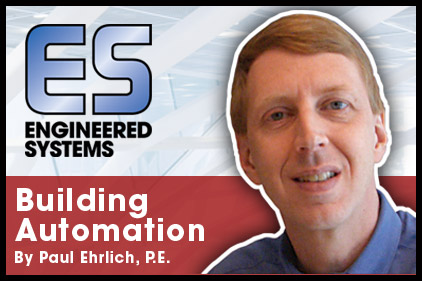• Strengthen the basics. There are skills that we use every day that we can always do better. How could we write a stronger specification or improve existing master specifications? Are there improved sequences of operation that we should be utilizing? Often these are both technical in nature as well as business-related. For example, choosing the right option for economizer changeover is a technical issue, while tighter specification language is business-related.
• Follow product changes. It is important to keep up with what is being provided by vendors. Over the last 10 years, we have seen a change to systems that are web based and follow open protocols. Today, we continue to see some changes to HVAC controls, but those are joined by many new products coming out for lighting control and energy information systems. Understanding and trying to select these new solutions is simultaneously one of the most frustrating and fascinating parts of our jobs!
• Learn new skills. It is always a good idea to extend our skill set. For example, if your background is HVAC design, learn about lighting, or better yet about network design. There are so many areas that BAS affects, from security to integrating renewable energy sources, that are invaluable for us to understand.
The challenge in continuing our education is that there is never time to do it. After all, if you are fortunate enough to be working, then it is unlikely that you have much (if any) free time to attend classes, conferences, or even online webinars. I find that there are several valuable sources of continuing education. These include:
• Online research. There is a tremendous amount of information available on the Internet. Often I will start a search on a topic of interest, and with some careful sorting, I am able to find excellent information from vendor materials to research papers from the DOE and others.
• Vendor meetings. Meeting in person or by phone with vendors is a great way to keep up with their new products and systems. It is easiest to get this information from those with whom we have a close working relationship, but it’s also important to seek out new suppliers.
• Conferences and seminars. While in person training is time consuming and expensive (event, travel, time, etc.), it is by far the highest quality and the best for networking. One great event is the annual High Performance Buildings Conference hosted by Engineered Systems and held in Washington from September 11-13, 2012.
• Webinars and local events. Finally, there are a number of online events such as webinars and local events including ASHRAE and USGBC meetings. These are all great resources to both improve existing skills and learn new ones.
• Magazines and blogs. Of course magazines such as Engineered Systems are also a fantastic source on new information, as well as the online versions and associated blogs and newsletters.
As we get ready for back to school, this is a good time to think about your own education program for the next 12 months. What skills need work? How many CEUs do you need to earn? What programs, classes or conferences look interesting? Create your own personal training program and work with your team to make it a reality. ES



